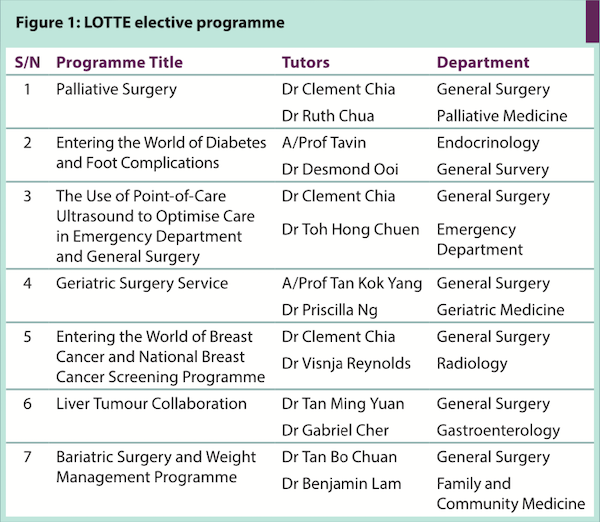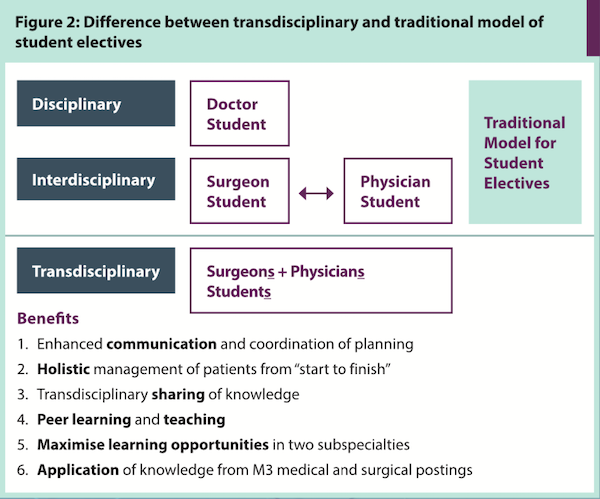Khoo Teck Puat Hospital (KTPH) held its inaugural Learning Oriented Teaching in Transdisciplinary Education (LOTTE) elective programme for Year 4 NUS Yong Loo Lin School of Medicine students in April 2021. This four-week programme focuses on education in an interprofessional collaborative setting and utilises adult learning theory1 to promote optimal independent learning in students after graduation. The impetus for the introduction of transdisciplinary education stems from the conviction of clinicians who collaborate and deliver transdisciplinary care to improve patient outcomes, especially in the geriatric population.2-4 During the height of the pandemic, transdisciplinary training and learning was urgently needed with the redeployment of manpower5 in enabling physicians and surgeons to work together to care for patients in dedicated COVID-19 wards.6 Transdisciplinary collaboration between doctors and nurses further led to frugal innovation in our institution during the pandemic.7 The evolution of transdisciplinary education thus enables students to learn in an authentic real-world working environment.
More about the programme
The LOTTE module consists of seven transdisciplinary themes offered by tutors from both surgical and medical disciplines (see Figure 1) that students could pre-select based on their interests. The transdisciplinary framework differs from the traditional electives model (see Figure 2); it emphasises inter-professional collaboration and learning between surgeons, physicians and students in the LOTTE programme collectively, enhances communication and coordination, maximises learning opportunities and allows the student to follow the patient journey from "start to finish".2

 Students in LOTTE divide their time equally in both surgical and medical subspecialties, attending ward rounds, clinics, operating theatres and even home visits. Students encapsulate their learning by presenting a complex case discussion via Zoom in the final week of the module to the rest of their peers in LOTTE as well as other student learners rotated to the institution. We apply the Learning Oriented Teaching model1 where tutors and students have shared guidance to the learning process. Tutors encourage ownership and independent learning by helping students to determine the relevant issues in the case discussion by themselves. Presenting on transdisciplinary care of complex patients also enables students to apply knowledge gathered from Year 3 medical and surgical rotations. Peer teaching provides additional motivation for students to enrich and benefit their peers and juniors attending the Zoom session.
Students in LOTTE divide their time equally in both surgical and medical subspecialties, attending ward rounds, clinics, operating theatres and even home visits. Students encapsulate their learning by presenting a complex case discussion via Zoom in the final week of the module to the rest of their peers in LOTTE as well as other student learners rotated to the institution. We apply the Learning Oriented Teaching model1 where tutors and students have shared guidance to the learning process. Tutors encourage ownership and independent learning by helping students to determine the relevant issues in the case discussion by themselves. Presenting on transdisciplinary care of complex patients also enables students to apply knowledge gathered from Year 3 medical and surgical rotations. Peer teaching provides additional motivation for students to enrich and benefit their peers and juniors attending the Zoom session.
From those involved
The following are reflections from some faculty and students involved in the LOTTE programme.
Dr Priscilla Ng (physician)
The title of the Bachelor of Medicine and Surgery degree and the separation of clinical rotations and examinations unintentionally divides medicine and surgery into silos. However, it is precisely the diversity of perspectives which provides synergism in answering complex clinical questions.8 For our Geriatric Surgery Service elective programme, the physician, surgeon, specialist nurse, physiotherapist and dietician worked together to ensure that students experienced transdisciplinary clinical practice. The medical component of the teaching was delivered on three levels: the management of internal medical conditions, the essentials of geriatric syndromes and the integration of the physician's role in perioperative care.
Another layer of transdisciplinary teaching was added when students from the various transdisciplinary teams shared their knowledge and experience with the larger LOTTE group. The peer teaching format allowed students to step up while tutors took the supporting role as content experts. This served as a formative assessment for students to demonstrate that they had internalised the principles of transdisciplinary care. Students were guided to ponder the reasons for atypical aspects of the clinical history and reflect on their learning experience in their peers' teaching sessions to refine their own presentation. The online teaching format did not pose a barrier to interactive learning with the use of varied apps for gamification, generating interest and participation. Transdisciplinary teaching thus provided a novel integrated experience for students while increasing the teacher's understanding of students' priorities and learning preferences.
Dr Shaun Chan (surgeon)
A wise surgeon once remarked: "A good surgeon knows how to operate; a better surgeon knows when to operate; the best surgeon knows when not to operate". To me, this expression epitomises our surgical craft, where patients are managed holistically rather than merely as cases to be operated on. In an era where our patients have increasingly complex medical issues (particularly in my subspecialty of vascular surgery!), every surgeon needs to work with his/her medical counterpart to achieve the best outcome for his/her patient. LOTTE was thus developed to allow medical students to appreciate this collaborative effort in their preprofessional careers.
Our students were exposed to both surgical and medical issues in patient management and given opportunities for hands-on experience. As one of the tutors involved, it was very fulfilling to witness how students were able to use this elective to consolidate their learning from prior medical and surgical rotations into a comprehensive understanding of the transdisciplinary theme and the patient at hand. This was evident during their combined case discussions, where the quality of presentation could serve as a refresher even for seasoned clinicians!
Despite this being our first run of the elective, it was heartening to know that our students found their time with us well spent and that they left inspired. I certainly look forward to welcoming future batches of medical students to this unique programme!
Brandon and Yao Zu (students)
Four weeks of electives passed by in a flash with a myriad of activities planned for us. We signed up for the "Palliative Surgery" programme and were attached to both General Surgery and Palliative Medicine departments. We witnessed how transdisciplinary team members worked together to bring comfort and relief to patients with advanced disease. Besides ward rounds, attending tutorials and scrubbing for surgery, we also attended family conferences and advance care planning sessions to learn communication skills and observe how doctors break bad news.
As part of the LOTTE programme, each team was required to present a case encountered during our posting to our peers. We presented a patient with metastatic breast cancer to the spine resulting in cord compression. One of the challenges we faced was communicating with her as she was both deaf and mute. To overcome the communication barrier, we had to use sign language and pictures to elicit her history, diagnosis and management plan. The process was tedious but meaningful. It also made us reflect on how fortunate we were and reinforced our resolution to improve our communication skills with patients.
We also interacted with other members of the transdisciplinary team, such as the palliative nurse, medical social worker, interventional radiologist, oncologist and orthopaedic surgeon, who were also involved in the care of this patient alongside the breast surgeon and palliative physician. This was to offer a holistic management plan catered to preserving the quality of life and reducing suffering for the patient. Another benefit of being in LOTTE was listening to other case presentations by our classmates which gave us insights into other transdisciplinary teams and the work they do.
One of the highlights of our elective was the home visit experience. We visited terminally ill patients under the HCA Home Hospice Care Service. We observed how patients are cared for in the comfort of their homes with loved ones by their side in the final days of their journey. It gave us a glimpse into the day-to-day issues that terminally ill patients face. We met a patient whose emotional support and source of comfort was the company of his cats at home, while another patient had a chihuahua. Seeing how a patient's grandchildren brought smiles to his face amid his pain from advanced disease made us understand what "adding life to days" instead of merely "adding days to life" in palliative care meant. We are thankful for this fruitful experience and would highly recommend LOTTE to our juniors.
Summary
In summary, transdisciplinary care will be most relevant to the graduating doctor given the increasingly complex geriatric healthcare landscape. LOTTE provides an authentic real-world elective experience for students and promotes independent self-directed learning in a collaborative environment.
Acknowledgements
We would like to thank A/Prof Yip Chee Chew, Ong Chye Sun and Dr Toh Hong Chuen from the KTPH Education Development Office for being ever so supportive of new educational initiatives, and Koh Bao Yun for doing a fantastic job coordinating logistics and student welfare. This would also not be possible without the collaboration of all our transdisciplinary colleagues. And finally the first inaugural batch of LOTTE students for being so receptive and enthusiastic to the concept of transdisciplinary medical education.